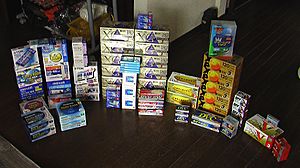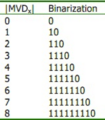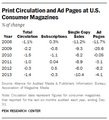Digital media facts for kids
Digital media is a super important part of our lives today! It means any kind of electronic media that uses digital codes. Think of it like a secret language made of just two numbers: "0" and "1".
Computers and other digital devices use these "0"s and "1"s to store, share, and understand information. This is called the binary system. So, when we talk about "digital," we're talking about information shown using these "0"s and "1"s.
Things like digital audio (music files), digital video (movies and YouTube videos), and other online content are all types of digital media. It's a huge change from older "analog" media, which worked in a different way. Digital media makes it much easier to create, share, and use information all over the world!
Contents
Digital vs. Analog Information
You might hear about "analog" and "digital" when talking about old and new technology.
- Analog information is like a continuous wave. Think of an old record player: the sound is stored as tiny grooves that match the sound waves. If you copy it, you might lose some quality.
- Digital information is like a series of snapshots. When an analog signal (like your voice) is turned into Digital information, it's called sampling. This means the continuous signal is measured at many tiny points and turned into "0"s and "1"s.
Most digital media today starts by turning analog things (like sounds or pictures) into digital data. Then, it can be stored, shared, and used by computers. This is how digital recordings, digital videos, and digital television work!
Why Digital Media is Awesome
Working with digital information has many cool benefits compared to analog data:
- Easy to Control: Digital data is much easier for computers to handle and change.
- Perfect Copies: You can make countless copies of digital data without losing any quality. Imagine copying a song from one digital file to another – it sounds exactly the same! With analog, each copy might get a little worse.
- Flexible: Digital information can be changed and used in many ways. For example, the same math operations can be used on a text file, an image file, or a sound file. This is because everything is just "0"s and "1"s to the computer.
- Smaller Files: Digital data can be made smaller using compression. This means you can fit more songs, videos, or pictures on your phone or computer.
Examples of Digital Media
Digital media is all around us! Here are some common examples:
- Cellphones
- Compact discs (CDs)
- Digital video (like streaming movies)
- Digital television
- e-books
- The Internet
- MiniDiscs
- Video games
- The World Wide Web
- e-Commerce (online shopping)
- And many kinds of interactive media
Related pages
- Analog-to-digital converter
- Content delivery
- Digital asset management
- Digital signal processing
- eRhetoric
- Electronic publishing
Images for kids
-
Hard drives store information in binary form and so are considered a type of physical digital media.
-
Digital codes, like binary, can be changed without reconfiguring mechanical parts
See also
 In Spanish: Medios digitales para niños
In Spanish: Medios digitales para niños
 | Frances Mary Albrier |
 | Whitney Young |
 | Muhammad Ali |









